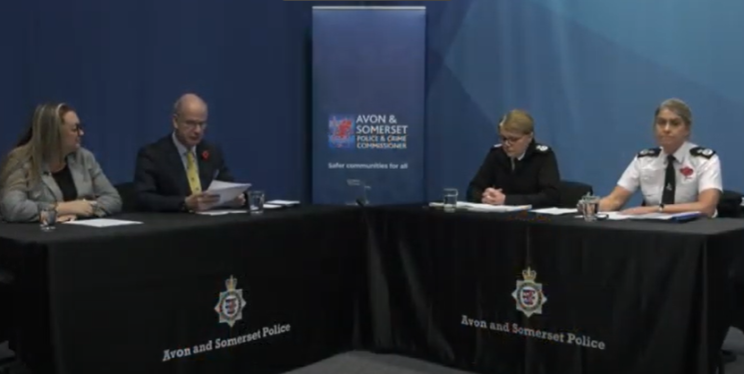PCC puts police and crime questions to Chief Constable

Last Wednesday (2 November), PCC Mark Shelford held his quarterly Performance and Accountability Board, which puts policing and crime questions to Chief Constable Sarah Crew.
The meeting, which was broadcast live to local residents and partners, sees the PCC hold the Chief Constable to account for delivering policing that is efficient and effective.
A number of topics were discussed including police complaints, shoplifting, illegal money-lending and work being done to tackle disproportionality and racism. The PCC also asked performance related questions focusing on homicide, victim satisfaction, visible policing and response time.
His Majesty’s Inspectorate for Constabulary and Fire and Rescue Services (HMICFRS) latest report regarding vetting, misconduct and misogyny was discussed as well as improving outcomes for victims of burglary.
Local people’s questions
The PCC started by putting local residents’ questions to the Chief Constable.
The first question asked about updates provided to members of the public who make a complaint to the police. The Deputy Chief Constable explained what is being done to improve contact with complainants including additional training and a supervisory review template.
The PCC then asked questions relating to shoplifting. The Chief Constable drew on her experiences of being a daughter of a small business owner and discussed Avon and Somerset Police’s role in the Business Forum. Chief Constable Sarah Crew emphasised the importance of businesses reporting theft via Avon and Somerset Police’s website.
Illegal money-lending was the next focus of conversation, specifically how Avon and Somerset Police work with the national illegal money-lending team and how local people can access support. Deputy Chief Constable Nikki Watson signposted residents to www.stoploansharks.co.uk and 0300 555 2222 to access support.
Tackling disproportionality and racism
PCC Mark Shelford and Chief Constable Sarah Crew discussed tackling disproportionality and racism in the criminal justice system, particularly Avon and Somerset having been chosen as an ‘ice-breaker’ force to trial new approaches to support Black communities and Black officers and staff. There was also a progress update on the implementation of the Identifying Disproportionality in the Criminal Justice System recommendations.
Performance
During the performance section of the meeting, the PCC asked if there are opportunities for Avon and Somerset to intervene earlier to help prevent homicide including work around the night-time economy and domestic and sexual violence.
The PCC moved on to ask performance questions relating victim satisfaction. Deputy Chief Constable Nikki Watson emphasised the importance of victim satisfaction and explained the work taking place to improve this performance measure including keeping victims informed and recruitment of new officers through Op Uplift.
There was then a discussion about the importance of visible policing with the Chief Constable explaining the use of the service’s visibility tool, which monitors officers’ and PCSOs’ time spent being visible in communities. In the last year, officers and PCSOs have spent 65.1% of their time outside of police stations.
Questions relating to response time were put to the Chief Constable with the response focusing on improving attendance times, an increase in police officer recruitment and preventing demand in the first place.
His Majesty’s Inspectorate for Constabulary and Fire and Rescue Services (HMICFRS)
Following HMICFRS inspection of vetting, misconduct and misogyny in the police, the PCC asked for reassurance regarding officers and staff not posing a security risk to communities. Chief Constable Sarah Crew emphasised she is never complacent about this matter, discussed investment in Professional Standards Department, the Vetting Department and Counter-Corruption Department and the responsibility every line manager has in supporting this work.
Finally, the PCC returned to the subject of burglary and improving outcomes for victims of acquisitive crime. The Chief Constable discussed the importance on drawing on learning from Operation Bluestone and focusing on suspect behaviour, disruption, offender management and partnership working to reducing crimes and detecting more of them.
